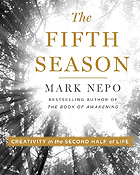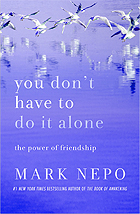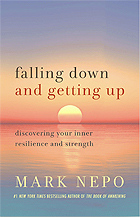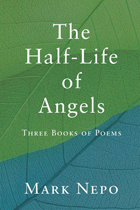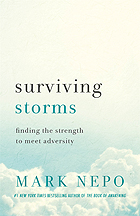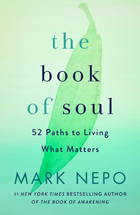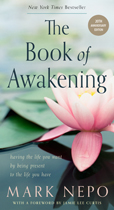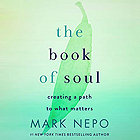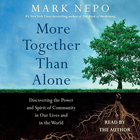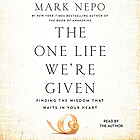| Books |  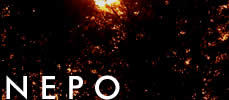  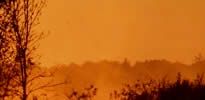 |
|
Unlearning Back To God: (Amazon), LONDON—NEW YORK, FEBRUARY 2006 BOOK DESCRIPTION The collection before you is the trail of my attempts over the last twenty years to experience and understand the nature of this mystery we wake in every day. These twenty-one essays contain seeds of inquiry that I have pursued much of my life. None of these attempts were created in a vacuum, but each represents how ideas can grow over time with their own sense of alchemy in the crucible of dialogue and sincerity. In that regard, this book of attempts is akin to a live recording and I hope you can feel the presence of others in and around the words. Much like a stone that has been worn by years of the stream, what is here is the one stone revealed by the current’s scouring. EXCERPTS FROM THE TITLE ESSAY, UNLEARNING BACK TO GOD Each person is born with an unencumbered spot, free of expectation and regret, free of ambition and embarrassment, free of fear and worry; an umbilical spot of grace where we were each first touched by God. It is this spot of grace that issues peace. Psychologists call this spot the Psyche, Theologians call it the Soul, Jung calls it the Seat of the Unconscious, Hindu masters call it Atman, Buddhists call it Dharma, Rilke calls it Inwardness, Sufis call it Qalb, and Jesus calls it the Center of our Love. To know this spot of Inwardness is to know who we are, not by surface markers of identity, not by where we work or what we wear or how we like to be addressed, but by feeling our place in relation to the Infinite and by inhabiting it. This is a hard lifelong task, for the nature of becoming is a constant filming over of where we begin, while the nature of being is a constant erosion of what is not essential. Each of us lives in the midst of this ongoing tension, growing tarnished or covered over, only to be worn back to that incorruptible spot of grace at our core. When the film is worn through, we have moments of enlightenment, moments of wholeness, moments of Satori as the Zen sages term it, moments of clear living when inner meets outer, moments of full integrity of being, moments of complete Oneness. And whether the film is a veil of culture, of memory, of mental or religious training, of trauma or sophistication, the removal of that film and the restoration of that timeless spot of grace is the goal of all therapy and education. Regardless of subject matter, this is the only thing worth teaching: how to uncover that original center and how to live there once it is restored. We call the filming over a deadening of heart, and the process of return, whether brought about through suffering or love, is how we unlearn our way back to God. FROM THE BRIDGE OF WELL-BEING Whether conscious of it or not, we are all engaged in the search for the unknown other who might complete us and join us to the Whole. And similar to pollination, we complete the world when, opening ourselves against great odds, some strange unknown partner inadvertently seeds our essence elsewhere. My interest in this surfaced with a dream. I was walking across a very old and rickety bridge, one that had been repaired generation after generation, and as I neared the very middle, a young man, reverberating in his own inner turmoil, jumped into the fast-moving river below. I was panicked and ran off the bridge and down to the bank where medics were on the scene, except instead of a physician, an Asian sage, barefoot and bearded, was suddenly beside me. As they were dragging the young man's body to us—he was water-logged and broken—I looked to the sage who appeared unalarmed. He registered the concern on my face, took me by the arm, and said, "It happens all the time." I asked, "What was he after?" "Oh," shrugged the sage, "he was searching for the fellow. He thought he saw it calling him in the water. It happens all the time." Inevitably, this brings us to the search for the fellow—the other, the stranger, the conduit, living or not, corporeal or not—the repeatable and various bridge that might join us to ourselves and thereby to the whole of God's Being. Fellow, from the Old Norse meaning partner, one who lays down wealth, from the Middle English welthe meaning originally well-being. Fellow, one who lays down his well-being; not laying down in the sense of giving up or relinquishing one’s true nature, but rather in the sense of unfolding or opening the way between living things. And so we are all searching—outwardly or inwardly—for the bridge of well-being, wherever we might find it. Why? Because in moments of being bridged we not only actualize ourselves but simultaneously are in accord with the Universe—we briefly become the Universe—the way it's impossible in a tree erect with wind to separate its leaves from the air. One of the great paradoxes of being is that each of us is born complete and yet we need contact with life in order to be whole. This, then, is the purpose of the stranger: to enliven what is dormant within us. We have touched on this before. It is worth emphasizing again. Once enlivened, it is our responsibility to keep what's dormant conscious and to integrate the fibers of hard-earned experience into the fabric of a living spirit.
REVIEWS This noted and prolific poet is showing by this collection that he is an insightful religious thinker and a decidedly credible voice of contemporary spirituality. His essays, “God, Self and Medicine,” “Troubled Waters,” and his thrillingly ground-breaking and compassionate “Where the HeartBeast Sings,” alone achieve an epic majesty. The subsequent essays reflect a synthesis of poetry and spirituality from which he forges his role as an eloquent spiritual teacher. It would be misleading to identify Mark Nepo as Jewish, Christian, Muslim, Buddhist, Jungian, comparatist or eclectic philosopher. His freshly experiential and metaphoric language, and absorbing of the words, speculations and practices of all these traditions together, indicate something simpler and perhaps more ancient. He evokes something of the poet-seer role so rarely found in our time. — Herbert Mason, Professor of History and Religious Thought, Boston University, translator of Gilgamesh, A Verse Narrative and Louis Massignon’s The Passion of al-Hallaj.
Mark Nepo is a deep optimist. It is a rare trait and thankfully he also writes elegantly. Shallow optimism is fueled by ignoring history and by enormous amounts of denial. Deep optimism is when you can still see—through the darkness of illness, despair, death, and injustice—the single light that illuminates the world. Mark never loses touch with that source. That is his gift. These essays, a collection of jewels, are his gifts to the rest of us. — James Fadiman, PhD, author of The Other Side of Haight and co-author of Essential Sufism.
These essays take me back home to the heart. I don't know of any other writer who can take me to that heart space like Nepo. This is a truly soulful book in which Nepo refuses to compromise on the heart's truth. — Robert Inchausti, author of Subversive Orthodoxy: Outlaws, Revolutionaries and Other Christians in Disguise and editor of The Pocket Thomas Merton.
We found this collection of essays fascinating and spiritually edifying. The kind of inner work Nepo describes is relevant to the challenges each of face as we seek beauty, make connections, cope with suffering , empathize with each other, find love, and encounter death. Whether musing about attention, spiritual ethics, rekindling inner light, or the bridge of well-being, Nepo spurs us to see things afresh. The result is a refreshing respect for the mysteries of life. — Frederic and Mary Ann Brussat, Read the full review online.
Whether musing about attention, spiritual ethics, rekindling inner light, or the bridge of well-being, Nepo spurs us to see things afresh from different angles. It's a talent he must have picked up over the years by wedding poetry and philosophy. The end result is a refreshing respect for the mysteries of life. (These are) twenty-one elegant essays on inwardness by a master poet, storyteller, and philosopher. — Frederic and Mary Ann Brussat, Spirituality & Practice |



|
